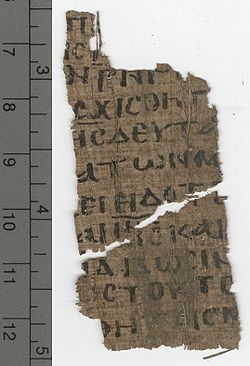| New Testament manuscript | |
 | |
| Name | P. Oxy. 4806 |
|---|---|
| Sign | 𝔓 |
| Text | Gospel of John 21:11-14,22-24 |
| Date | 4th / 5th century |
| Script | Greek |
| Found | Oxyrhynchus, Egypt |
| Now at | Sackler Library |
| Cite | R. Hatzilambrou, P. J. Parsons, J. Chapa OP LXXI (London: 2007), pp. 11-14. |
| Size | x cm (28 x 12) |
| Type | Alexandrian (?) |
| Category | - |
| Note | concurs with codex W |
Papyrus 122 (in the Gregory-Aland numbering), designated by 𝔓, is an early copy of the New Testament in Greek. It is a papyrus manuscript of the Gospel of John.
Description
Only two pieces from one leaf have survived to the present day. The surviving texts of John are verses 21:11-14,22-24, they are in a fragmentary condition. The manuscript paleographically had been assigned to the 4th or 5th century (INTF). It was written by irregular hand.
It uses nomina sacra. Name Ιησους (Jesus) is abbreviated to ΙΗΣ (majority of manuscripts used abbreviation ΙΣ). The number "one hundred and fifty-three" is written in Greek numerals — ΡΝΓ.
The Greek text of this codex probably is a representative of the Alexandrian text-type.
Text
In John 21:14 omitted word Ιησους (Jesus), just like in Codex Washingtonianus, rest of the manuscripts contain this word, usually with an article (ο Ιησους).
| 𝔓 | Translation |
| Ανεβη ουν Σιμων Πετρος και ειλ | So Simon Peter went aboard and |
| κυσεν το δικτυον εις την γην μεσ | hauled the net ashore, full |
| τον ιχθυων μεγαλων ΡΝΓ και το | of large fish, a 153 of them; and |
| σουτων οντων ουκ εσχισθη το δικ | although there were so many, the net was not |
| τυον λεγει αυτοις ο ΙΗΣ δευτε αριστη | torn. Jesus said to them, “Come and have |
| σατε ουδεις δε ετολμα των μαθητων ε | breakfast.” Now none of the disciples dared |
| ξετασαι αυτων Συ τις ει ειδοτες οτι | ask him, “Who are you?” They knew |
| ο ΚΣ εστιν ερχεται ΙΗΣ και λαμ | it was the Lord. Jesus came and took |
| βανει τον αρτον και διδωσιν αυτοις | the bread and gave it to them, |
| και το οψαριον ομοιως τουτο ηδη | and so with the fish. This was now |
| τριτον εφανερωθη τοις μαθηταις | the third time that He was revealed to the disciples |
| εγερθεις εκ νεκρων | after He was raised from the dead. |
In red colour missing letters.
Location
The manuscript currently is housed at the Papyrology Rooms of the Sackler Library at Oxford with the shelf number P. Oxy. 4806.
See also
References
- "Liste Handschriften". Münster: Institute for New Testament Textual Research. Retrieved 15 August 2011.
- Codex Washingtonianus has eclectic text, but in John 5:12 – 21:25 it represents the Alexandrian.
- Codex Sinaiticus, Codex Alexandrinus, Codex Regius, Codex Koridethi, Codex Zacynthius, f, f, and manuscripts of the Byzantine text-type (without article: Codex Vaticanus, Codex Ephraemi Rescriptus, and Codex Bezae).
Further reading
- R. Hatzilambrou, P. J. Parsons, J. Chapa The Oxyrhynchus Papyri LXXI (London: 2007), pp. 11–14.
External links
Official registration
- "Continuation of the Manuscript List" Institute for New Testament Textual Research, University of Münster. Retrieved April 9, 2008
| New Testament papyri | |
|---|---|
| 𝔓 |
|
| Gospel of John | |||||
|---|---|---|---|---|---|
| Bible (New Testament) |
| ||||
| Events (chronological) |
| ||||
| Phrases | |||||
| People |
| ||||
| Places | |||||
| "I AM" sayings | |||||
| Related | |||||
| Adaptations |
| ||||
| Manuscripts | |||||
| Sources | |||||